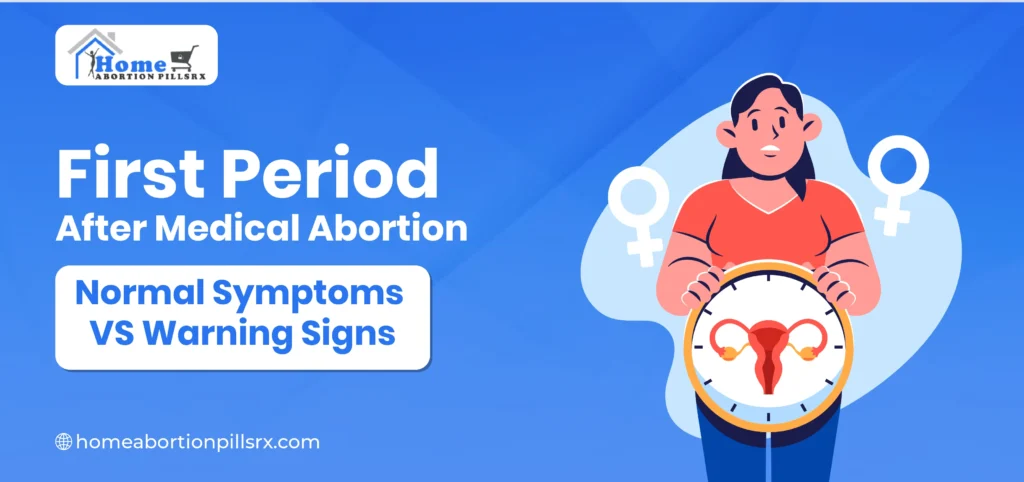First Period After Medical Abortion: Normal Symptoms vs Warning Signs

Feeling unsure about your first period after a medical abortion? You’re not alone. It’s completely normal to have questions and feel a little anxious about what to expect. Your body has been through a significant hormonal and physical process, and it needs time to reset.
Whether you’ve recently gone through the process or are preparing for what comes next, this guide is here to walk you through it. We’ll cover when to expect your period, what it might be like, and the important signs that mean it’s time to check in with a healthcare provider.
When Will My Period Return? The 4-to-6-Week Rule
The most common question is: “When will I get my period back?”
For most people, your first true menstrual period will arrive about 4 to 6 weeks after the abortion process is complete.
It’s important to remember that the heavy bleeding you experience immediately after taking the medication is not your period. That is your body expelling the pregnancy tissue as part of the abortion process itself. Your actual period will only come after your body’s hormones have returned to their normal, non-pregnant baseline and your cycle has restarted.
What if My Period Is More Than 6 Weeks Late?
If it has been more than six weeks and your period still hasn’t arrived, it’s time to take action. Don’t panic just be proactive.
- Take a Home Pregnancy Test: This is the quickest way to check what’s going on.
- Contact Your Healthcare Provider: Let them know your period is late and you have a negative (or positive) pregnancy test.
A late period could mean a couple of things: your body is just taking a little longer to regulate, or, less commonly, it could signal an incomplete abortion (where some tissue remains) or a new pregnancy. Remember, you can become fertile again very quickly sometimes as soon as two weeks after an abortion.
Your ‘New Normal’: What to Expect from Your First Period
When your first period does arrive, it might feel a bit different from your usual cycle. Think of it as your body’s “reset” period. Here’s what many people experience:
- Heavier Flow and Small Clots: It’s common for the first period to be heavier than you’re used to. Your uterine lining has been rebuilding, so there is more to shed. Seeing some small clots is also normal.
- Stronger Cramps: You might notice more intense cramping. Your uterus is still contracting and returning to its pre-pregnancy size. A heating pad and over-the-counter pain relief (like ibuprofen) can provide comfort.
- Intense PMS Symptoms: With your hormones working to stabilize, you might experience more pronounced PMS symptoms like mood swings, breast tenderness, fatigue, or nausea. Be gentle with yourself during this time.
Your Health & Safety Checklist: When to Contact a Healthcare Provider
Listening to your body is key. While a different-feeling period is normal, certain symptoms are not and require medical attention.
Call a doctor or your clinic right away if you experience:
- No period after 6 weeks, especially with a positive pregnancy test.
- Extremely heavy bleeding: Soaking through two or more heavy-duty pads in an hour, for two hours in a row.
- Large clots: Passing clots consistently larger than a lemon or golf ball.
- Signs of infection: A fever over 100.4°F (38°C), or foul-smelling vaginal discharge.
- Severe pain that isn’t helped by pain medication.
These signs are rare, but they are important to watch for. Trust your instincts if something feels wrong, it’s always best to get it checked out.
Thinking Ahead: Birth Control and Protecting Your Health
Because you can get pregnant again very quickly after an abortion (even before your first period arrives), it’s important to think about birth control.
You can discuss starting a method like the pill, patch, IUD, or implant with your provider. Many options can be started immediately after the abortion process is complete. Using condoms is also a great way to prevent both pregnancy and STIs.
Final Thoughts: Be Kind to Yourself
Your first period after a medical abortion is a sign that your body is returning to its natural rhythm. It might be heavier, more uncomfortable, and more emotional than you’re used to, and that is okay.
What matters most is that you listen to your body, understand the difference between what’s normal and what’s not, and never hesitate to seek medical support when you need it. Your timeline is your own, and you are not alone in this experience.
FAQS: FIRST PERIOD AFTER MEDICAL ABORTION
